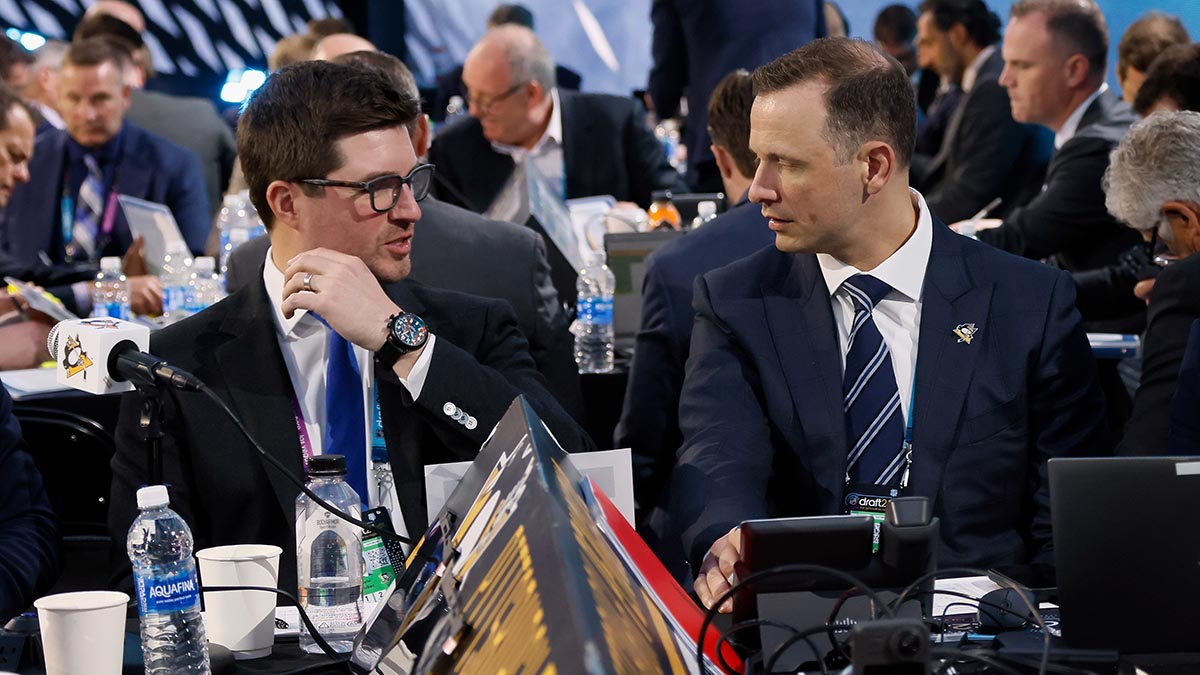![]() Patrick Williams, TheAHL.com Features Writer
Patrick Williams, TheAHL.com Features Writer
Jason Spezza learned to play the pro game in the AHL. Now he’s learning the management game there as well.
Before Spezza solidified himself as a top-line NHL scorer who went on to play 1,248 games and ring up 995 points, he was a second-overall draft pick developing his game in the Ottawa Senators organization. Spezza made his pro debut with the Grand Rapids Griffins during the 2002 Calder Cup Playoffs, then divided the 2002-03 season between Ottawa and the Binghamton Senators.
AHL Hall of Famer John Paddock mentored Spezza, then 19, as Binghamton’s head coach and provided the tough guidance that Spezza now says that he needed then.
Spezza returned to Binghamton during the NHL lockout season of 2004-05, amassed a league-leading 117 points and was named the AHL’s most valuable player.
The Mississauga, Ont., native retired in 2022, after his third season with the Toronto Maple Leafs. It was there that Spezza first really connected with general manager Kyle Dubas, who had brought Spezza to Toronto to help the Leafs pursue a Stanley Cup.
As he started to wind down his playing career, Spezza’s attention turned toward what might be next. Management felt like a good possible fit, and he had someone like Dubas there for advice.
“I can’t imagine my life without hockey in it,” Spezza said.
So after retiring, Spezza went directly into management as a special assistant to Dubas. The mandate was to start learning the management business. And when Dubas departed for the Pittsburgh Penguins in 2023, Spezza came with him as an assistant general manager.
This summer Spezza added another role to his portfolio: general manager of the Wilkes-Barre/Scranton Penguins.
Now that Dubas is in his second season with the Pittsburgh organization, a lot is new with Wilkes-Barre/Scranton. Spezza played a heavy role in hiring new head coach Kirk MacDonald. Pittsburgh also acted aggressively this past summer to turn over its AHL veteran group with several free-agent signings. With the NHL team’s core now well into the 30-and-up age bracket, Pittsburgh will be counting heavily on its pipeline to crank out young talent to take eventual roles on the NHL roster, and experience is needed in Wilkes-Barre/Scranton to assist in that process.
Again, the mandate is to learn. Spezza will remain based in Pittsburgh, but he will be handling all of Wilkes-Barre/Scranton’s day-to-day affairs and will be in town on a regular basis. When Dubas was in Toronto, be it with the Leafs or the Marlies, the AHL affiliate always received considerable attention. Toronto management acted aggressively to sign top free agents for the Marlies, which paid off with a Calder Cup championship in 2018. The team never lacked for talent, a top-notch training facility, or any other resources needed to both develop prospects as well as to win hockey games.
That same formula has now made its way to Pennsylvania, stretching across the state from Pittsburgh to Wilkes-Barre. The AHL Penguins reached the Calder Cup Finals three times in their first nine seasons, but have just one series win since 2016, leaving local fans hungry for a playoff run. And Pittsburgh management is hungry to see success for its AHL affiliate, with Dubas knowing well what it meant for Leafs prospects when the Marlies played deep into the postseason.
Naturally moving into this role has taken Spezza back to his own days as a top prospect trying to establish himself with Binghamton. It was where a young future Ottawa core began to take shape. Antoine Vermette, Chris Kelly, Brian McGrattan and the late Ray Emery were some of his Binghamton teammates as a rookie who went on to join him as Ottawa mainstays playing for Paddock, who eventually moved on to the NHL club as well.
“It’s a very, very different landscape,” Spezza said of today’s game. “It was definitely the tough-love era. The AHL was good for me. It really helped shape who I was as a player and made me more resilient.”
Now he is following the same path that Dubas took a decade ago, when he moved up to Toronto from Sault Ste. Marie of the Ontario Hockey League.
“He’s a great leader,” Spezza said of Dubas. “He’s a great communicator. I think his demeanor is something that I really respect. He’s well thought-out. He has excellent process. He’s probably showing me why having good process is so important…if you do all your preparation ahead of time, you’re never really surprised by any situation that can come up. Coming from a player to a manager now, one thing you realize is daily how much stuff comes up behind the scenes.
“And then the way that he treats people. I think he can be a firm boss. He can be somebody that is very demanding in terms of his standard, but he’s a great person. I consider him a great friend and really happy to be working for him.”
Hiring MacDonald was one of Spezza’s first major tasks. Dubas let Spezza take control of that process. As the coaching resumes arrived and accumulated, Spezza sifted through them, began to pare down his list, and then entered into the interview process. And then he had to make a decision and went with MacDonald.
“It was a great process to go through,” Spezza said. “I had never done anything like that. I thought I learned a lot from it.”
With MacDonald in place to coach a solid roster, Spezza is excited to see what it all can mean for Wilkes-Barre/Scranton fans. He remembers coming into Mohegan Arena as a player for intense meetings between the two rivals.
“I love the small-town feel,” Spezza said. “I think that it’s a great hockey city. We’ve put together some young, exciting prospects that will ignite the fan base. We know that it’s a deep fan base, a fan base that loves hockey.
“To me, that’s exciting in terms of taking over the team because I’ve seen it at its best.”
On the American Hockey League beat for two decades, TheAHL.com features writer Patrick Williams also currently covers the league for NHL.com and FloSports and is a regular contributor on SiriusXM NHL Network Radio. He was the recipient of the AHL’s James H. Ellery Memorial Award for his outstanding coverage of the league in 2016.






































